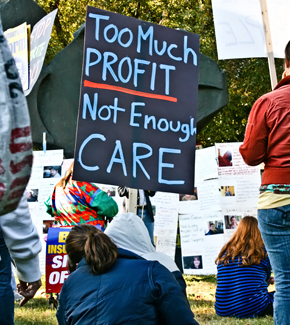Three of the biggest health insurers have announced quarterly earnings in the past few days. If Americans were able to eavesdrop on what executives from those firms tell their Wall Street masters every three months, they would have a better understanding of why premiums keep going up while the number of people with medical coverage keeps going down.
 It only takes three words, when you get right down to it, to describe the real of those folks: profits over people.
It only takes three words, when you get right down to it, to describe the real of those folks: profits over people.
CIGNA and Humana are scheduled to report earnings this week. The three companies that have already spoken -- UnitedHealth, WellPoint and Aetna -- earned a combined $2.51 billion from April through the end of June, more than analysts expected. On a per share basis, their earnings were up more than 17 percent on average compared with the second quarter of 2010.

 It only takes three words, when you get right down to it, to describe the real of those folks: profits over people.
It only takes three words, when you get right down to it, to describe the real of those folks: profits over people. If opponents of health care reform could view the grant money in the Affordable Care Act as an investment in our children rather than wasteful spending, I believe at least some of them would eventually accept that we're better off with the law than without it.
If opponents of health care reform could view the grant money in the Affordable Care Act as an investment in our children rather than wasteful spending, I believe at least some of them would eventually accept that we're better off with the law than without it. (Editor's note: The Center is deeply grateful for all the research into ALEC politicians underway, especially by Daily KOS bloggers, and we are offering the tips today in light of the many questions people have asked about how to help with this research.) The Center for Media and Democracy recently unveiled a trove of "model" bills voted on behind closed doors by corporations and politicians through the American Legislative Exchange Council (ALEC). Many of these bills and provisions have been introduced in state houses across the country without any mention of the ALEC connection and have become legally binding. In addition to the analysis of the more than 800 pieces legislation on "
(Editor's note: The Center is deeply grateful for all the research into ALEC politicians underway, especially by Daily KOS bloggers, and we are offering the tips today in light of the many questions people have asked about how to help with this research.) The Center for Media and Democracy recently unveiled a trove of "model" bills voted on behind closed doors by corporations and politicians through the American Legislative Exchange Council (ALEC). Many of these bills and provisions have been introduced in state houses across the country without any mention of the ALEC connection and have become legally binding. In addition to the analysis of the more than 800 pieces legislation on " The
The  Although he passed away in 2006, states are now grappling with many of the toxic notions left behind by University of Chicago economist,
Although he passed away in 2006, states are now grappling with many of the toxic notions left behind by University of Chicago economist,